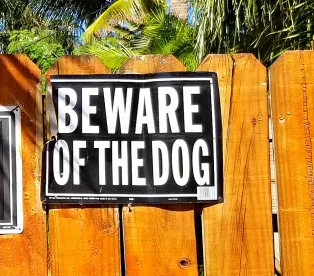When you experience a dog attack, it can be an awful, traumatizing experience. After all, dogs are supposed to be man’s best friend. The injuries a dog attack can inflict are painful and will likely require a process of medical examinations and treatments before your life returns to normal. You deserve fair compensation as you recover, to ease the financial and mental burden of your recovery.
The pathway to the money you are entitled to can be complicated. The last thing you want to worry about while you recuperate is how you will pay for your treatment.
Know the Law
New Jersey laws state that a dog owner is “strictly liable” in a civil lawsuit if their dog bites you on public property or on private property that you were legally allowed to be on. Let’s say you’re walking down your neighborhood sidewalk or were invited to your neighbor’s backyard barbecue, and their dog bites you. Under strict liability, the owner is liable for the attack regardless of whether or not the dog had a history of attacks.
If a dog attacks you but does not bite you, the strict liability laws do not apply. But dog owners can also be found negligent if they are careless or fail to control their pets. A dog owner may be found negligent for leaving an aggressive dog unsupervised in an unfenced yard or walking a big, aggressive dog without a muzzle.
Before consulting with our experienced attorneys, make sure that you weren’t trespassing at the time of the attack. If you were illegally on the dog owner’s property at the time of the attack, courts may find that you deserve little to no compensation for the injuries you sustained.
What should I do after being bitten?
-
Find the owner of the dog – After a dog attack, the first step you should take is to find the dog’s owner and have them get their animal under control. Many times, the owner is present during the attack, making your job easy. If the dog is on the loose, the owner can corral it and keep it from attacking you or anyone else. While speaking with the owner, ask them for their name, contact information, and the dog’s vaccination records. Avoid discussing the attack itself and keep a calm and pleasant attitude as you gather the information you will need. It can be tough to stay calm after a traumatic attack, but as dogs generally don’t have insurance companies, it is important to get relevant information from the owner.
-
Contact animal control – Especially if the dog that bit you doesn’t have an owner or the owner can’t be found, your best bet is to contact professionals who are trained to handle an aggressive dog safely and humanely. It’s also important to notify animal control so that their rabies control unit can keep accurate track of dog bites in case of an outbreak.
-
Get medical treatment – As soon as it’s safe, you should seek immediate medical attention. Dog bites carry a high risk of infection. Your doctor will know best how to treat your injuries and whether or not you should get a rabies shot.
-
Document the attack – If possible, take photos of the dog, your injuries, and the scene of the attack. If anyone witnessed the attack, get their contact information so that your attorney can contact them further down the line.
How can I avoid dog attacks?
-
Stay in safe areas – Dogs are territorial and very defensive towards strangers in their territory. Don’t enter a backyard with a dog, particularly an unfamiliar dog, unless you’re with the dog’s owner who can help put the dog at ease. Stray dogs are a different matter, as it can be hard to tell what they consider their territory. Luckily, most dogs will growl in an attempt to warn you away from their home. If you encounter a snarling dog in your path, slowly head back the way you came.
-
Be calm and unthreatening – Dogs react to body language and movements. When you’re around an unfamiliar dog, don’t rush toward it and try and pet it. The dog isn’t used to you and may not be comfortable with you touching it. Keep a friendly tone of voice, avoid making sudden motions around the dog, and let it approach you on its own. A good tip is to offer the dog the back of your hand to sniff. Once they’ve identified your scent, they often become much more friendly. Even when a dog is extremely aggressive – barking and snarling at you – avoid the urge to turn and run away from the dog. The sudden movement can cause the dog to see you as prey or a threat, and cause them to attack.




 />i
/>i

